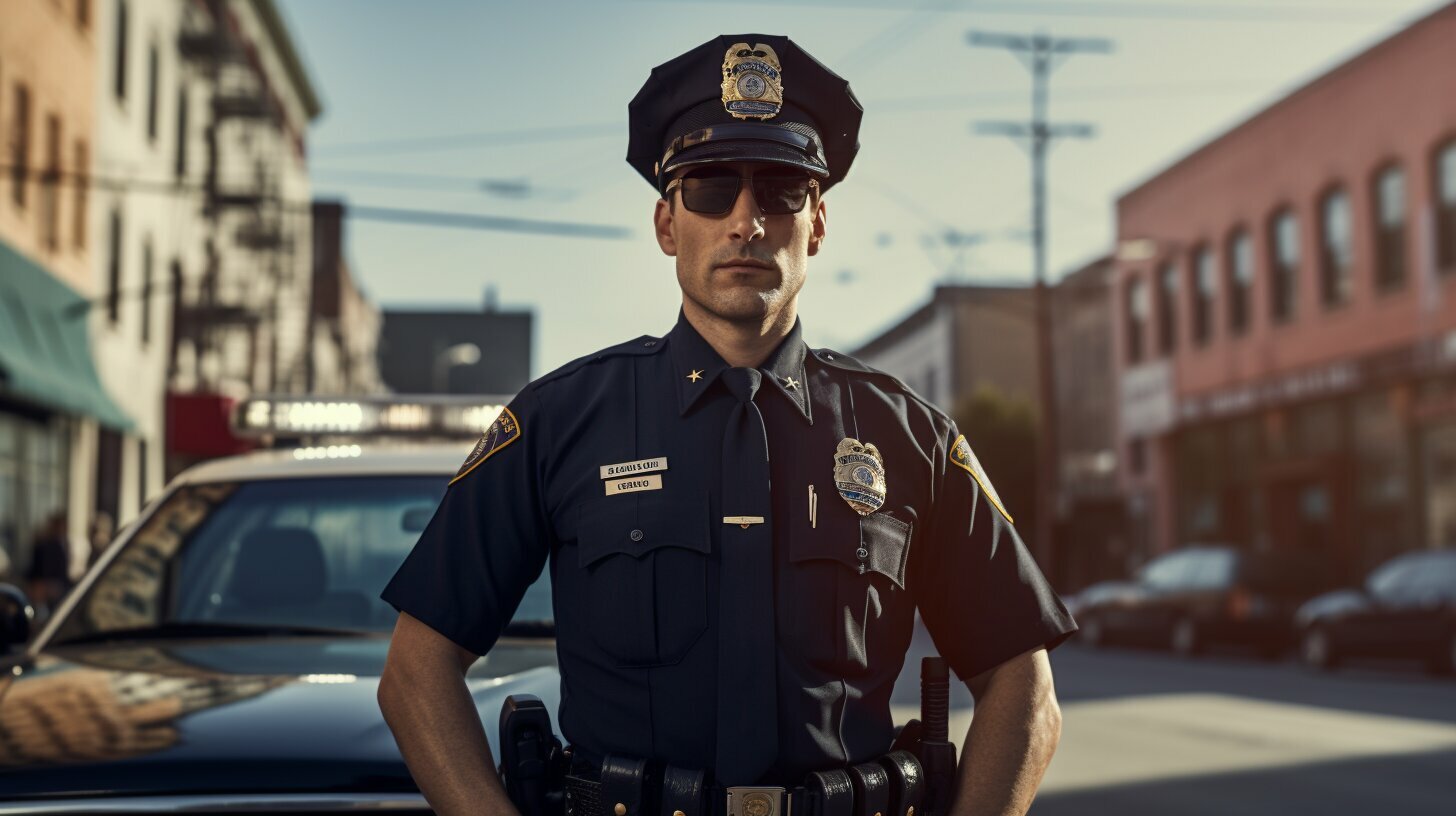Unmasking the Mystery: Why are Police Called Cops?
Have you ever wondered why police officers are commonly referred to as “cops”? Join me as we explore the fascinating story behind this widely used nickname.
Key Takeaways:
- The nickname “cops” is the most common term for police officers in the United States.
- The origins of the term “cops” have been subject to various theories and speculations.
- The true origin of the word “cop” comes from its verb usage meaning “to take or seize.”
- Other popular nicknames for police officers include “the fuzz” and “5-0.”
- Nicknames for police officers can vary regionally and have changed throughout American history.
Theories and Speculations
The term “cops” has sparked various theories and speculations about its meaning and etymology, offering us different perspectives on its origins. Linguistic analysis of the term “cops” has led to several intriguing theories that attempt to explain its usage as a nickname for police officers.
One popular theory suggests that “cops” is an abbreviation of “constable on patrol,” highlighting the role of police officers in maintaining public order. However, this theory lacks solid historical evidence and remains speculative.
Another intriguing speculation is that “cops” is derived from the term “copper.” This theory suggests that the shiny badges and buttons on police uniforms resembled the metal copper, leading to the nickname. While this theory seems plausible, its exact origins are difficult to pinpoint.
Despite these speculations, the true origin of the word “cop” as a nickname for police officers can be traced back to its verb usage. Originally, “cop” meant “to take or seize,” and it later extended to include the person doing the arresting. This etymology reveals a fascinating connection between the act of taking or seizing and the role of police officers in enforcing the law.
| Possible Origins | Likelihood |
|---|---|
| “Constable on patrol” abbreviation | Speculative |
| Derived from “copper” | Possible |
| Originated from verb usage | Highly likely |
In conclusion, the meaning behind the word “cops” has generated numerous theories and speculations. While some theories remain speculative, the true origin of the term can be traced back to its verb usage meaning “to take or seize.” The nickname “cops” has become deeply ingrained in American culture, synonymous with “police,” and widely recognized throughout the United States.
The True Origin: To Take or Seize
Contrary to popular belief, the true meaning behind the word “cops” lies in its original verb usage, signifying the act of taking or seizing. This reveals a fascinating connection between the actions of law enforcement and the slang term used to refer to them. While there are various theories and speculations surrounding the nickname “cops,” it is the verb usage that provides the most concrete explanation for its origin.
Back in the early 18th century, the word “cop” was commonly used as a verb to describe the act of apprehending or capturing someone. This usage, derived from the Dutch word “kapen,” reflected the authority of law enforcement officers to take or seize individuals who had committed crimes. Over time, this verb evolved and expanded to include the person performing the arresting, hence giving rise to the popular nickname “cops” for police officers.
This linguistic evolution is a testament to the rich history and development of language. Just as the English language constantly adapts and evolves, so too do the words and phrases used to describe societal roles and professions. The transformation of “cop” from a verb meaning “to take or seize” to a noun representing law enforcement officers exemplifies the dynamic nature of language and its ability to reflect the changing world around us.
| Origin of the Term “Cops” | Significance of the Word “Cops” |
|---|---|
| The word “cop” originates from its verb usage meaning “to take or seize,” reflecting the authority of law enforcement officers in apprehending criminals. | The nickname “cops” has become synonymous with “police” and is widely recognized, representing the essential role law enforcement plays in maintaining public safety. |
Other Nicknames for Police Officers
While “cops” may be the most common nickname for police officers, there have been numerous other colorful monikers used to describe these law enforcement professionals. From the classic “the fuzz” to the iconic “5-0,” these nicknames have become ingrained in American culture and often reflect the unique characteristics and traits associated with police officers in different regions.
In addition to “the fuzz” and “5-0,” there are several other interesting nicknames that have been used to refer to police officers throughout American history. One such nickname is “gumshoe,” which is often associated with detectives. This term originated in the early 20th century and was derived from the fact that detectives would often wear soft-soled shoes to avoid making noise while they were investigating.
Another nickname that has gained popularity is “smokey.” This term is primarily used to refer to police officers who wear hats similar to Smokey the Bear, the mascot of the United States Forest Service. The term “smokey” was popularized in the 1970s and has since been used to refer to law enforcement officers in general, particularly those who are known for their strict enforcement of traffic laws.
| Nickname | Origin |
|---|---|
| The Fuzz | Derived from the sound of static over police radios |
| 5-0 | Popularized by the television show Hawaii Five-O |
| Gumshoe | Derived from detectives’ soft-soled shoes |
| Smokey | Referring to officers wearing hats similar to Smokey the Bear |
It is worth noting that these nicknames may vary regionally in the United States, with different areas adopting their own unique terms to refer to police officers. These nicknames not only add a touch of flair and humor to the profession but also reflect the cultural and linguistic diversity of the country.
In conclusion, while “cops” may be the most commonly used nickname for police officers, there is a rich tapestry of other nicknames that have been used over the years. From “the fuzz” to “smokey,” these nicknames have become an integral part of American law enforcement culture, reflecting the history, characteristics, and regional nuances of police work.
Regional Variations and Pop Culture Influences
The usage of the term “cops” as a nickname for police officers can vary across different regions within the United States and has also been heavily influenced by popular culture. In some areas, the term “cops” is commonly used, while in others, alternative nicknames such as “police,” “law enforcement,” or even local slang terms may be more prevalent. This regional variation reflects the diverse linguistic and cultural landscape of the country.
Popular culture has played a significant role in perpetuating the use of the term “cops.” Television shows like “Cops” and “Law & Order” have brought the daily lives of police officers into the homes of millions of Americans, familiarizing them with the nickname. Additionally, movies, books, and even music have contributed to the widespread recognition and acceptance of “cops” as a nickname for police officers.
“Being called ‘cops’ is just part of the job. It’s like a badge of honor, a symbol of the trust and authority we carry. And yes, some days can be tough, but at the end of the day, we’re proud to be called ‘cops’.” – Officer Smith
It’s worth noting that while the term “cops” is widely used and recognized, it is essential to respect the preferences and cultural nuances of different regions. In some areas, using the term “cops” may be seen as informal or even disrespectful, while in others, it is embraced as a term of endearment. Just as language evolves and adapts over time, so does the language used to describe law enforcement officers.
| Region | Common Nickname for Police Officers |
|---|---|
| New York City | The Finest |
| Chicago | The Boys in Blue |
| Los Angeles | The LAPD |
| New Orleans | The Big Easy’s Finest |
In conclusion, the term “cops” has become deeply ingrained in American culture, representing the men and women who protect and serve their communities. While its exact origin may remain somewhat of a mystery, its usage and significance are undeniable. The term “cops” not only reflects the regional diversity of the United States but also showcases the powerful influence of popular culture in shaping our language and perceptions.
The Fuzz and 5-0: Other Famous Nicknames
In addition to “cops,” there are other widely recognized nicknames for police officers, such as “the fuzz” and “5-0,” each with its own intriguing history. These nicknames have become ingrained in American society, often used in movies, TV shows, and everyday conversations. Let’s take a closer look at their origins and cultural significance.
“The fuzz” is a term commonly used in the United States to refer to the police. While its exact origin is uncertain, one popular theory suggests that it comes from the sound of static over police radios. Others believe it may have derived from the phrase “fuzz ball,” which refers to the dense wooly texture of some police uniforms. Regardless of its true origin, “the fuzz” has become synonymous with law enforcement, portraying a sense of authority and power.
Another well-known nickname for police is “5-0,” which gained popularity through the television show Hawaii Five-O. The term “5-0” originated from the radio code used by the Honolulu Police Department, where “5-0” stood for the highest level of police response. Over time, this term spread beyond Hawaii and became a widely recognized nickname for police officers nationwide.
In addition to these two popular nicknames, there have been various older terms used to refer to police officers throughout American history. Detectives were often called “gumshoes,” a term that originated from the rubber-soled shoes they wore to silently trail suspects. And officers wearing hats similar to Smokey the Bear were often referred to as “smokeys.” These nicknames showcase the creativity and cultural references that have shaped the way we talk about law enforcement.
Table: Famous Nicknames for Police Officers
| Nickname | Origin |
|---|---|
| Cops | Derived from the verb “to take or seize,” reflecting their role in law enforcement. |
| The Fuzz | Possible origin from the sound of static on police radios or the texture of some police uniforms. |
| 5-0 | Based on the radio code used by the Honolulu Police Department, indicating the highest level of police response. |
| Gumshoe | A term used to refer to detectives, originating from the rubber-soled shoes they wore for stealth. |
| Smokey | A nickname for officers with hats similar to Smokey the Bear, symbolizing authority. |
These nicknames not only reflect the evolving language and cultural references but also serve to humanize and create a sense of camaraderie within the law enforcement community. They highlight the fascinating history and linguistic quirks surrounding the diverse ways we refer to our dedicated police officers, who work tirelessly to keep our communities safe.
Conclusion
The nickname “cops” has become deeply ingrained in our language and culture, and understanding its origin sheds light on the longstanding connection between law enforcement and this colloquial term.
While there are various theories about the origins of the nickname “cops,” the true origin can be traced back to its verb usage meaning “to take or seize.” This usage later expanded to include the person doing the arresting, thus referring to police officers.
Other nicknames for police officers, such as “the fuzz” and “5-0,” have their own interesting origin stories. “The fuzz” may have originated from the sound of static over police radios, while “5-0” gained popularity through the television show Hawaii Five-O. Throughout American history, there have been various other nicknames for police officers, including “gumshoe” for detectives and “smokey” for officers wearing hats similar to Smokey the Bear. These nicknames may also vary regionally in the United States.
In conclusion, the term “cops” has become synonymous with “police” and is widely used and recognized. Its rich history and various theories surrounding its origins add to its intrigue and charm. Whether one prefers to call them “cops,” “the fuzz,” or any other nickname, the important thing to remember is the crucial role that law enforcement plays in our society.
FAQ
Why are police called cops?
The nickname “cops” for police officers in the United States has its origins in the verb usage of the word, meaning “to take or seize.” Over time, this expanded to include the person doing the arresting, and eventually became synonymous with “police.”
What are some other nicknames for police officers?
In addition to “cops,” you may have heard police officers referred to as “the fuzz,” which might come from the sound of static over police radios. Another popular nickname is “5-0,” popularized by the television show Hawaii Five-O. Throughout American history, there have also been various older nicknames such as “gumshoe” for detectives and “smokey” for officers wearing hats similar to Smokey the Bear.
Do these nicknames vary regionally in the US?
Yes, the usage of the term “cops” may vary regionally in the United States. Different regions may have their own unique nicknames and slang for police officers.
What is the true origin of the word “cops” in reference to police officers?
While there are various theories about the origins of the nickname, the true origin of the word “cops” in reference to police officers comes from its verb usage meaning “to take or seize.” This usage evolved over time to include the person doing the arresting, eventually becoming a common nickname for police.
Are there any famous nicknames besides “cops”?
Yes, two other famous nicknames for police officers are “the fuzz,” possibly derived from the sound of static over police radios, and “5-0,” popularized by the television show Hawaii Five-O.
How has the nickname “cops” been portrayed in popular culture?
The term “cops” is widely recognized and used in popular culture to refer to police officers. It has been featured in various TV shows, movies, and songs, often depicting law enforcement activities and investigations.
- Discovering Why Do Women Wear Lipstick: A Deeper Look - 19/12/2023
- Why Do Golfers Only Wear One Glove? - 16/12/2023
- Why Don’t Hobbits Wear Shoes? - 14/12/2023
Hi, I’m Rhiannon, the lead author behind The News Wire. As a passionate journalist, I strive to bring you the latest news and updates from all over the world. With a keen eye for detail and a dedication to unbiased reporting, I aim to deliver well-researched and informative articles that keep you informed and engaged. From breaking news to in-depth analyses, I cover a wide range of topics with the aim of keeping you in the loop. Join me on The News Wire as we explore the dynamic and ever-changing landscapes of global events, uncovering the stories that matter most.






